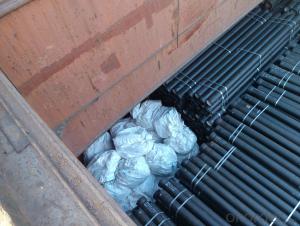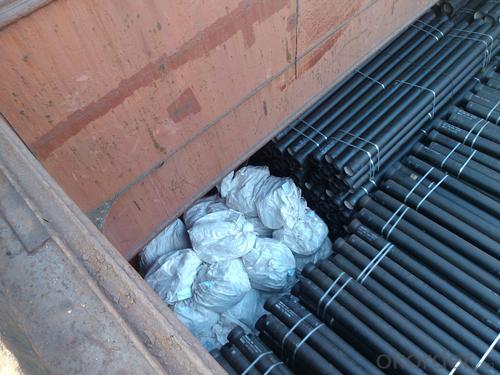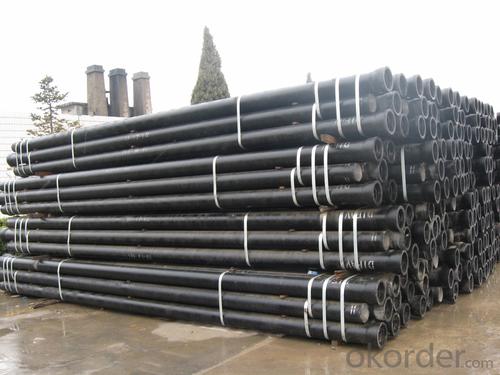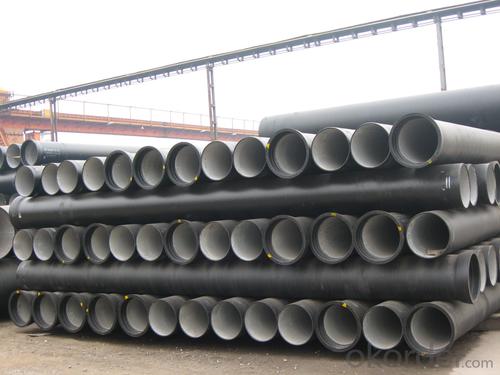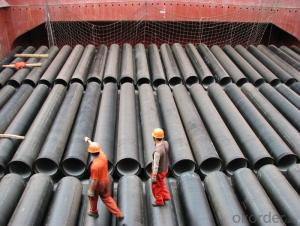DUCTILE IRON PIPE DN800 K9/C
- Loading Port:
- China Main Port
- Payment Terms:
- TT OR LC
- Min Order Qty:
- -
- Supply Capability:
- -
OKorder Service Pledge
OKorder Financial Service
You Might Also Like
Specification:
1) The standard of pipe: ISO2531:1998, K9
2) Effective length: 6m
3) Inner cement line: Portland cement line as per ISO4179
4) Zinc coating: at least 130g/m2 as per ISO8179
5) Bitumen painting: at least 70um as per ISO8179
6) With 100% quantity of NBR ring, or SBR ring, or EPDM ring as per ISO4633
7) DN80mm-800mm
8) High strength, lighter than grey iron, good corrosion resistance, no furring, small flow resistance, easy fixing, long life tome about 100 yeas
9) Produced by Hangzhou chunfeng machine
10) Checked by automatic inspection equipment
11) Composition:
Chemical composition | | | | |||
Chemical composition | Ductile Cast Iron Pipe (%) | Grey iron pipe (%) | Steel pipe (%) | | | |
C | 3.5-4.0 | 3.2-3.8 | 0.1-0.2 | | | |
Si | 1.9-2.6 | 1.4-2.2 | 0.15-0.4 | | | |
Mn | 0.15-0.45 | 0.4-0.6 | 0.3-0.6 | | | |
P | ≤0.06 | ≤0.3 | 0.02-0.03 | | | |
S | ≤0.02 | ≤0.1 | 0.02-0.03 | | | |
Mg | 0.03-0.06 |
|
| | | |
12) Feature:
Mechanical properties | | | | |||
| Ductile Cast Iron Pipe | Grey Iron Pipe | Steel Pipe | | | |
Tensile Strength(Mpa) | ≥420 | 150-260 | ≥400 | | | |
Yield Strength(Mpa) | ≥300 | No Confirmation | No Confirmation | | | |
Bending Strength(Mpa) | ≥590 | 200-360 | ≥400 | | | |
Elongation (%) | ≥10 | Neglected | ≥18 | | | |
Brinell Hardness(HBS) | ≤230 | ≤230 | About 140 | | | |
13) T type mechanical joint
14) Packing: in bulk or container
- Q: Ductile iron pipe converter, steel transition DN100 turn 100, what is the specific accessories name? Can you supply photos?
- Plastic steel conversion parts performance description: long name high density polyethylene is mainly used for buried water supply and gas transmission pipeline links, can effectively and closely linked pipe port, quality assurance, reasonable price and price.
- Q: Can ductile iron pipes be used for pressure reducing stations?
- Yes, ductile iron pipes can be used for pressure reducing stations. Ductile iron pipes are known for their high strength and durability, making them suitable for handling high-pressure applications. They have excellent resistance to corrosion and can withstand the mechanical stresses and strains associated with pressure reducing stations. Additionally, ductile iron pipes have a smooth interior surface, which reduces friction losses and helps maintain a constant and controlled pressure within the system. Therefore, ductile iron pipes are a reliable and commonly used material for pressure reducing stations.
- Q: How are ductile iron pipes repaired if they get damaged?
- Ductile iron pipes are typically repaired using various methods depending on the extent of the damage. Common repair techniques include spot repair, where damaged sections are cut out and replaced with new pipe sections, and trenchless repair methods such as pipe lining or pipe bursting. These methods minimize disruption and excavation while ensuring the structural integrity of the pipe is restored.
- Q: What is the expected fatigue life of ductile iron pipes under cyclic loading?
- The expected fatigue life of ductile iron pipes under cyclic loading can vary depending on various factors such as the material properties, design considerations, loading conditions, and maintenance practices. However, ductile iron pipes are generally known for their excellent fatigue resistance, and when properly designed and installed, they can have a long fatigue life of several decades or more.
- Q: Ductile iron pipe is how many years warranty
- Ductile iron pipe warranty is unlimited.
- Q: Are ductile iron pipes suitable for deep burial installations?
- Yes, ductile iron pipes are suitable for deep burial installations. Ductile iron is known for its durability and strength, which makes it capable of withstanding the pressure and weight of being buried deep underground. Additionally, ductile iron is highly resistant to corrosion, which further enhances its suitability for long-term underground applications.
- Q: Can ductile iron pipe be used for hydropower systems?
- Yes, ductile iron pipe can be used for hydropower systems. Ductile iron pipe is known for its strength, durability, and corrosion resistance, which makes it an ideal choice for various applications, including hydropower systems. The high tensile strength of ductile iron allows it to withstand the high pressure and load requirements of such systems. Additionally, its corrosion resistance properties make it suitable for use in water environments, ensuring a long lifespan and minimal maintenance needs. Therefore, ductile iron pipe can be effectively utilized for hydropower systems, providing a reliable and efficient solution for transporting water and supporting the infrastructure of the system.
- Q: How many meters does the cast iron water supply pipe dn150,1 tons?
- When pouring added calcium alloy in the flow inlet for graft inoculation, every time after the pouring, need in the mold surface with compressed air spraying a thin layer of dry calcium silicate powder, a centrifuge is composed of upper and lower halves of the closed shell, the supporting cast roller is installed on the bottom of the shell, the mold in front of a ring gear mounted on the housing at the end of the DC motor through the transmission gear direct mold, shell mold through Hugh ends are equipped with sealing ring, the front end of the shell shell installed with half ring a turning cylinder pictophonetic mountain Rae centrifuge under the wheels, so as to make reciprocating motion on the inclined orbit
- Q: How can the ductile iron pipe be tested?
- The pipeline of water supply pipeline in winter pressure test, must have the corresponding prevention measures, antifreeze, then should give water pipes in the filling should be appropriate in some high, then the protective material for a little more to the interface covered.
- Q: Are ductile iron pipes resistant to environmental stress cracking?
- Indeed, environmental stress cracking is not a concern for ductile iron pipes. Ductile iron, a form of cast iron that has been infused with small amounts of magnesium for enhanced strength and ductility, possesses this advantageous quality. Consequently, these pipes exhibit exceptional resistance to cracking and harm caused by environmental stress factors like temperature fluctuations, soil shifting, and corrosive elements present in the surrounding environment. Moreover, the inherent robustness and adaptability of ductile iron enable it to endure substantial external pressure and stress without succumbing to cracking or failure. Ultimately, ductile iron pipes are a dependable and long-lasting option for various purposes, such as the transportation of water and wastewater, thanks to their ability to withstand environmental stress cracking.
Send your message to us
DUCTILE IRON PIPE DN800 K9/C
- Loading Port:
- China Main Port
- Payment Terms:
- TT OR LC
- Min Order Qty:
- -
- Supply Capability:
- -
OKorder Service Pledge
OKorder Financial Service
Similar products
Hot products
Hot Searches
Related keywords
